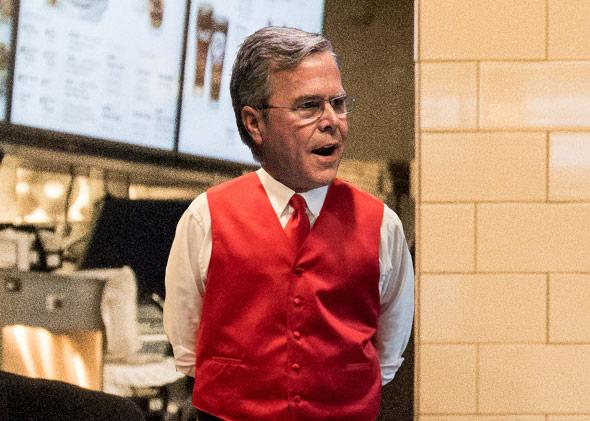Only a few months into primary season and the GOP has already identified plenty of scapegoats. Immigrants. Planned Parenthood. Psychology majors.
As Jeb Bush said at a recent town hall, “Universities ought to have skin in the game. … When a student shows up, they ought to say, ‘Hey, that psych major deal … that’s great … but realize you’re going to be working at Chick-fil-A.”
After bemoaning that “the No. 1 degree program in the country is psychology,” Bush concluded, “I just don’t think people are getting jobs as psych majors.”
This is rich coming from the candidate who responded to the Oregon shootings with “Stuff happens” before pivoting to the party line that mass violence is a mental health problem, not a gun problem. So who is going to solve those mental health problems if not psychology majors?
As a psychology professor, I’m biased, but I think psychology majors have more to offer than fast food prep skills. We live in a complex society with challenging problems. The social sciences offer tools to solve these problems.
Take the rising cost of health care. We can debate how it’s funded, but one fact is indisputable: Americans today die from different diseases than our great-grandparents did. Every semester, I show my undergraduates a chart juxtaposing the leading causes of death in 1900 and in 2010. A century ago, we were struck down by infectious illnesses like pneumonia and the flu. Today, our top killers are chronic diseases. Cancer. Heart disease. Diabetes. What these diseases have in common is that they’re lifestyle-related, which means that behavior matters. Until we develop a wonder drug to cure addiction and eliminate obesity, our most costly health problems are linked with everyday choices. Guess who can understand these choices and figure out how to help people quit smoking, start exercising, and put on sunscreen? Psychology majors.
Psychology majors can also work with patients coping with illness, caregiving stress, insomnia, and chronic pain. My research focuses on the biological effects of psychological stress. We know that children who suffer early trauma show increased risk of alcoholism, heart disease, cancer, and lung disease as adults. In Wednesday night’s debate, Mike Huckabee argued that we can cut health care costs by eradicating chronic illnesses. But curing these illnesses isn’t just about developing better medication. It’s about managing stress and preventing psychosocial adversity. Psychology majors can help us do that.
And it’s not just physical health problems that cost society. Depression is the second-leading cause of disability worldwide, resulting in more than 200 million lost workdays each year and costing employers upward of $50 billion. Mental health and substance abuse disorders carry a massive societal burden and are also massively undertreated, with poor and minority Americans receiving the least adequate care. Studies estimate that half to two-thirds of Americans with a psychiatric diagnosis receive zero mental health care. With a treatment shortage that severe, we don’t need fewer psychology majors; we need more.
Contrary to what Bush may think, the biggest employer of psychologists isn’t the fast food industry, but the Department of Veterans Affairs. As an intern at a VA hospital, I worked with patients with post-traumatic stress disorder, panic attacks, anger management problems, and substance abuse disorders. Psychologists have developed effective behavioral treatments for all of these problems, but waitlists are long. We need psychology majors—not just doctoral-level psychologists, but paraprofessionals at the bachelor’s and master’s levels—to disseminate and deliver mental health treatments that work.
This week, a video of a police officer body-slamming a South Carolina student went viral. One of the many troubling aspects of this video is the fact that an armed officer was in the classroom at all. Over the last decade, police presence in schools has risen while funding for school psychologists and guidance counselors has declined. It’s been reported that the 16-year-old girl in the video was recently orphaned and is in foster care. She could have benefited from psychological counseling, not an arrest record. The incident reflects a costly societal trend of outsourcing mental health care to the criminal justice system. Many inmates have psychiatric diagnoses, and many receive “treatments”—like prolonged solitary confinement—that exacerbate rather than ameliorate these diagnoses. We need psychology majors to help turn the school-to-prison pipeline into a school-to-treatment pipeline. Social science can inform an evidence-based correction system and help us bring mental health care to troubled citizens before they offend.
Jeb Bush’s diss on psychology majors may have been offhand. But it reflects a disturbing Republican distrust of the sciences, particularly the social sciences. Last spring, the House passed legislation to cut the National Science Foundation’s Directorate for Social, Behavioral, and Economic Sciences by 45 percent. And just this month, the House debated a bill that would further hamstring NSF by demanding that its grants be in the “national interest.” Never mind that research spending consumes a minuscule slice of the federal budget. This legislation opens the door for politicians, rather than scientists, to set our national research agenda.
Science and technology education has been in vogue lately, and it’s great that we’re getting kids excited about engineering and tech. But by glorifying “hard” sciences at the expense of the humanities and social sciences, we’re missing out on important bodies of knowledge. Technological innovation moves us forward, but for society to thrive, we also need social workers, preschool teachers, therapists, nurses, guidance counselors, and home health care providers—people who do the hard and often undervalued work of caring for others. Psychology majors can excel in those positions and many others, and Chick-fil-A will have to find its employees elsewhere. After Wednesday night’s debate, I can think of least one Republican candidate who will be needing a job.
